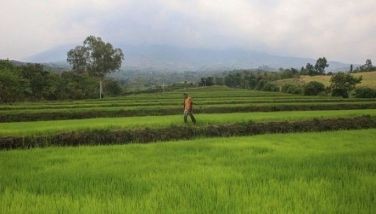Gov’t hospitals on ‘Code White’
December 5, 2004 | 12:00am
Government hospitals and medical personnel are standing at the ready in the aftermath of the three strong typhoons that devastated much of Luzon during the past few days.
Health Secretary Manuel Dayrit yesterday put all government hospitals in typhoon-stricken areas on "Code White" alert.
Dayrit said these hospitals should ensure that they have enough manpower and medical supplies to attend to typhoon victims.
"This alert status requires hospitals to be in a high state of readiness, with all key personnel and departments on standby for any eventuality," he said.
The DOH also dispatched medical teams to assist typhoon victims — particularly those who were forced to seek shelter in congested evacuation centers. The DOH has also deployed its epidemiological staff to closely monitor disease patterns that may lead to outbreaks.
Dayrit said the DOH has already sent initial batches of medicines and other supplies worth over P100,000 to the affected communities.
As this developed, the DOH advised the public to observe health measures to ward off illnesses, as all government hospitals in areas affected by typhoon "Yoyong" were put on heightened alert.
In a health advisory, the DOH said the public should make sure they get their drinking water from a "safe source."
"When in doubt, do not drink. Boil for two minutes or chlorinate drinking water to make it safe," the DOH advised. "Water containers should be clean and covered all the time."
The DOH also said proper sanitation and hygiene should be observed when preparing food to prevent water and food-borne diseases like cholera and typhoid fever.
"Food should be well-cooked. Left-overs should be covered and kept away from household pests. Food waste should be disposed of properly," the DOH said in its advisory.
The DOH also advised the public to "keep dry and warm" by wearing the appropriate clothing.
Families taking shelter in relocation sites should "consult a doctor at once if you, or any member of your household have any sign or symptom (of illnesses) to prevent the spread of infection in the evacuation area," the DOH said.
"The common infections or diseases that may spread in an evacuation area include coughs and colds, acute gastroenteritis, skin and eye infections, measles, dengue, leptospirosis and hepatitis A," the DOH said in its advisory.
Health Secretary Manuel Dayrit yesterday put all government hospitals in typhoon-stricken areas on "Code White" alert.
Dayrit said these hospitals should ensure that they have enough manpower and medical supplies to attend to typhoon victims.
"This alert status requires hospitals to be in a high state of readiness, with all key personnel and departments on standby for any eventuality," he said.
The DOH also dispatched medical teams to assist typhoon victims — particularly those who were forced to seek shelter in congested evacuation centers. The DOH has also deployed its epidemiological staff to closely monitor disease patterns that may lead to outbreaks.
Dayrit said the DOH has already sent initial batches of medicines and other supplies worth over P100,000 to the affected communities.
As this developed, the DOH advised the public to observe health measures to ward off illnesses, as all government hospitals in areas affected by typhoon "Yoyong" were put on heightened alert.
In a health advisory, the DOH said the public should make sure they get their drinking water from a "safe source."
"When in doubt, do not drink. Boil for two minutes or chlorinate drinking water to make it safe," the DOH advised. "Water containers should be clean and covered all the time."
The DOH also said proper sanitation and hygiene should be observed when preparing food to prevent water and food-borne diseases like cholera and typhoid fever.
"Food should be well-cooked. Left-overs should be covered and kept away from household pests. Food waste should be disposed of properly," the DOH said in its advisory.
The DOH also advised the public to "keep dry and warm" by wearing the appropriate clothing.
Families taking shelter in relocation sites should "consult a doctor at once if you, or any member of your household have any sign or symptom (of illnesses) to prevent the spread of infection in the evacuation area," the DOH said.
"The common infections or diseases that may spread in an evacuation area include coughs and colds, acute gastroenteritis, skin and eye infections, measles, dengue, leptospirosis and hepatitis A," the DOH said in its advisory.
BrandSpace Articles
<
>
- Latest
- Trending
Trending
Latest
Trending
Latest
Recommended






























